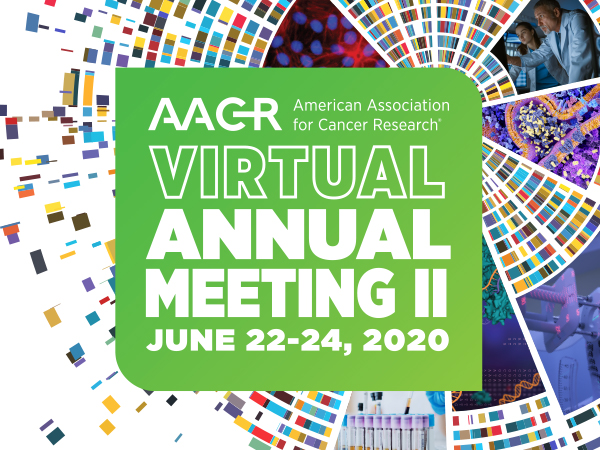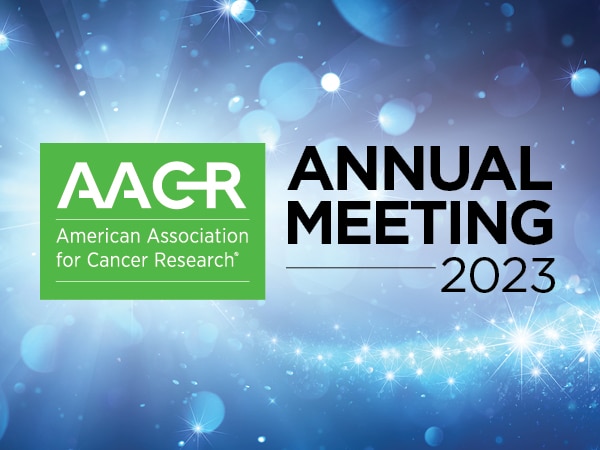AACR Annual Meeting 2023: Opening Ceremony Heralds Extraordinary Science
As 21,000 cancer researchers, clinicians, policymakers, and patient advocates thronged the Orange County Convention Center, Margaret Foti, PhD, MD (hc), chief executive officer of the American Association for Cancer Research (AACR), officially launched the AACR Annual Meeting 2023 in a celebratory Opening Ceremony.
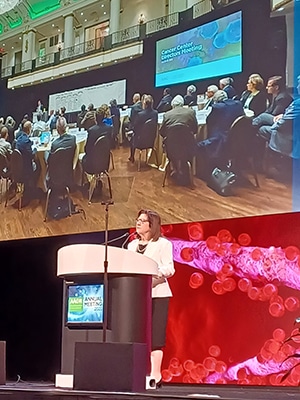
“It is a great joy to welcome all of you to the AACR Annual Meeting 2023,” Foti said. “I am extremely excited about the extraordinary science that will be presented during the next four days, encompassing the entire continuum of cancer research—from population science, cancer prevention, and early detection to survivorship; from cutting-edge basic science to practice-changing clinical studies.”
This year’s Annual Meeting features the theme “Advancing the Frontiers of Cancer Science and Medicine.” Foti told the crowd that the scientific and technological breakthroughs achieved by the cancer research community have brought about tremendous progress for patients with cancer. The continued power of their global brain trust will help propel the next wave of progress, she said.
Foti was joined by AACR President Lisa M. Coussens, PhD, FAACR, of the Knight Cancer Institute at Oregon Health & Science University. As Coussens prepared to conclude her year-long presidency, she and Foti reflected on some exciting initiatives that took root in the past year and will no doubt flourish under incoming President Philip Greenberg, MD, FAACR, of the Fred Hutchinson Cancer Research Center.
Celebrating recent advances
In July 2022, the AACR convened 80 cancer center directors in Philadelphia to discuss key issues that underpin our shared mission. The group met again this week during the Annual Meeting and are committed to further collaborations, Foti noted.
Also in the past year, the AACR launched the Trust in Science Task Force. “The full lifesaving potential of science for the public good can only be realized if our work is supported by a solid foundation of public trust,” Foti said. Moving forward, supported by a grant from Bristol Myers Squibb, the task force will work to increase the participation of patients from underrepresented minority groups in oncology clinical trials and improve bidirectional communication between cancer researchers and underserved populations.
Honoring milestones
Along with a full slate of awards for individuals who have had a profound impact on cancer research, advocacy, policy, and science communications, the Opening Ceremony provided an opportunity to honor several AACR programs that celebrated landmark anniversaries this year. This year marks the 10th anniversary for the Rally for Medical Research, through which the medical research community urges Congress to make federal funding for the National Institutes of Health a national priority. It’s also the 10th anniversary of Cancer Immunology Research, one of the AACR’s 10 highly regarded scientific journals.
Sunday’s Opening Ceremony also featured several dozen patient advocates who have participated in the revolutionary AACR Scientist↔Survivor Program® (SSP), which began 25 years ago following the famed 1998 rally known as “The March: Coming Together to Conquer Cancer.” Anna Barker, PhD, FAACR, who had co-chaired the March Research Task Force, was inspired to build upon the event’s collaborative spirit and initiated the first gathering of SSP at the AACR Annual Meeting in 1999.
As patients joined Foti and Barker on stage, ready for several days of presenting posters, attending scientific sessions, and collaborating with their scientific mentors, Foti reflected on the powerful role advocates have played in motivating and inspiring the cancer research community.
“When Anna Barker conceptualized SSP, ‘patient advocates’ didn’t really exist,” Foti said. “Today, these informed and engaged patient advocates are critical to advancing progress in cancer research and care.”
Barker concurred: “Patients are the center of everything we do.”
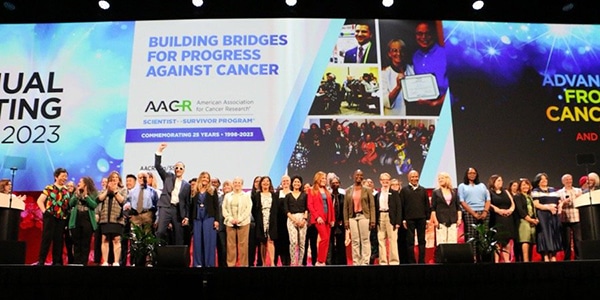
Looking toward the future
The Opening Ceremony featured the announcements of several exciting new initiatives. Some highlights:
- A new AACR High School Student Summer Internship Program will provide students with dynamic and innovative STEM experiences through four-week summer internships in collaboration with cancer centers. The program will avidly recruit students from underrepresented and underserved communities.
- AACR Project GENIE, the AACR’s real-world data sharing project, will expand the GENIE Consortium by adding four new institutions that genomically profile and treat diverse and representative patient populations.
- The AACR stands ready to support the National Cancer Institute (NCI) as it advances the recently released National Cancer Plan. NCI Director Monica Bertagnolli will discuss the plan in future meeting sessions; check back with Cancer Research Catalyst for in-depth coverage.
Together, these commemorations of past milestones and announcements of future plans demonstrate the diverse and dynamic nature of the AACR, Coussens said.
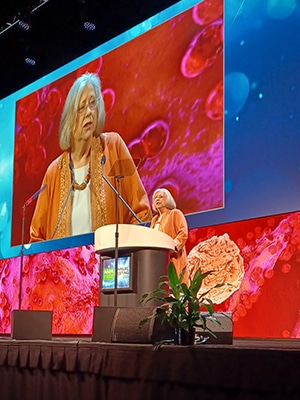
“AACR takes great pride in accelerating progress across the whole spectrum of cancer research,” Coussens said. “As my term as AACR President draws to a close, I anticipate the next exciting research progress that will come from our members and the future extraordinary contributions by the AACR to the cancer field.”
As the Opening Ceremony segued into the Opening Plenary, this year’s Annual Meeting Program Chair, Robert H. Vonderheide, MD, DPhil, offered some advice for meeting attendees. His key tips:
- Attend each plenary session from start to finish.
- Go to sessions on topics unfamiliar to you. “Step into a frontier and enjoy,” he urged.
- Try to leave the meeting with two or three new collaborations. Vonderheide encouraged attendees to be bold in asking fellow researchers to stay in touch and forge new relationships.
- Reach out to the students and other trainees here. “They are the future. We are counting on them,” he said.
Finally, Vonderheide said, attendees should dive in to the expansive program and make the most of their time at the meeting. “Cultivate a spirit of adventure,” he said, “and let me know how it goes.”


